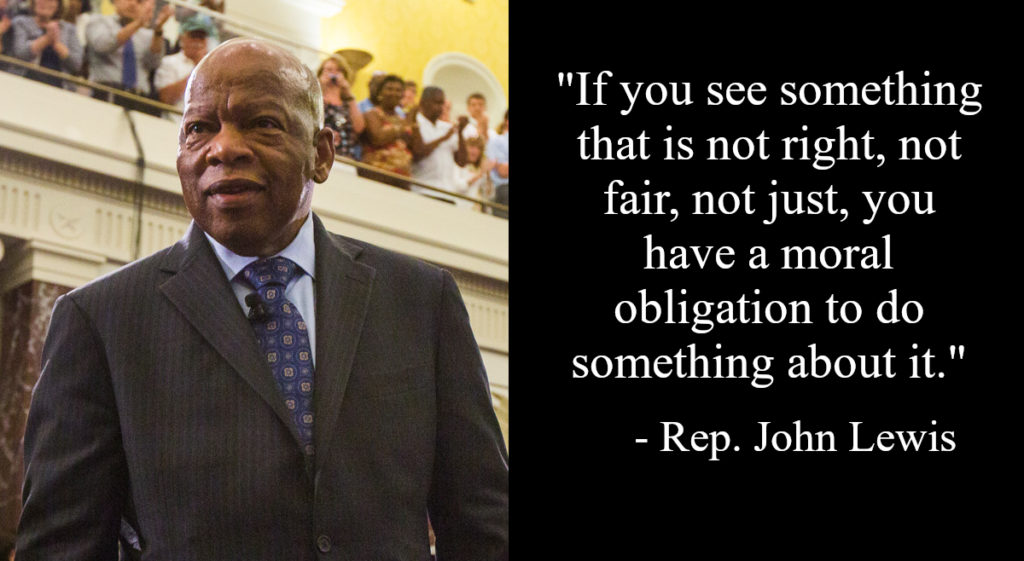

By Asmita - Jul 17, 2025
Nearly one hundred "Good Trouble Lives On" protests swept across Massachusetts on July 17, honoring Congressman John Lewis and advocating for civil rights. Activists gathered in a state-wide demonstration against perceived threats to democracy, voting rights, and marginalized communities. On Cape Cod, diverse groups of participants engaged in peaceful protests, emphasizing community solidarity and nonviolent civic resistance. Organizers encouraged creative expression and highlighted urgent issues like voting rights and immigration, fostering hope and unity through music and speeches. Protesters across Massachusetts called for worker protections, equality for marginalized groups, and fair elections, demonstrating a commitment to defending democracy and Lewis's legacy.

Eric Haynes via Delmarva Public Media
LATEST
Nearly one hundred "Good Trouble Lives On" protests took place across Massachusetts on July 17, in a sweeping statewide demonstration honoring the late Congressman John Lewis and pushing back against recent threats to civil rights. Inspired by Lewis’s famous call to “get in good trouble, necessary trouble and help redeem the soul of America,” activists joined forces under a coalition of organizations committed to democracy, equal rights, and voter protection. These coordinated actions were sparked by growing concerns among pro-democracy groups regarding recent federal initiatives that they perceive as undermining voting rights, civil liberties, and marginalized communities. The day of action marked the fifth anniversary of Lewis’s passing and was timed to coincide with similar demonstrations nationwide, drawing tens of thousands of participants into the streets.
On Cape Cod, multiple gatherings attracted both seasoned activists and first-time protesters from local towns and the islands. In Hyannis, demonstrators assembled at the airport rotary (499 Barnstable Road) from 5:30 to 7:00 p.m., waving signs and chanting calls for justice, fair elections, and the end of harsh immigration raids. Nantucket saw around 650 people in attendance, underscoring the broad geographic reach and resonance of the protests, which also occurred in Falmouth, Bourne, and Martha’s Vineyard. The spirit of Cape activism was rooted in community solidarity, with organizers intentionally scheduling events throughout the region to ensure residents from all corners of the Cape had access to peaceful assembly and action. From the bustling main streets of Hyannis to the quieter corners of Vineyard Haven and Aquinnah, the call to collective action was met with powerful local engagement.
These protests were not only a demonstration against specific government policies but also a celebration of Lewis’s legacy and a reaffirmation of nonviolent civic resistance. Organizers on Cape Cod encouraged participants to bring creative homemade signs and to attend with a spirit of peaceful purpose, echoing Lewis’s lifetime commitment to nonviolent activism. At many sites, community leaders gave speeches on voting rights, immigration, and equal protection, highlighting the urgent need for vigilance against any rollback of civil liberties. Local musicians and performers contributed to the gatherings, fostering an atmosphere of hope and unity.
Throughout the Cape and across Massachusetts, demonstrators of diverse backgrounds joined hands to advocate for worker protections, the rights of Black, Indigenous, immigrant, and LGBTQIA+ communities, and a renewed demand for fair and accessible elections. Sites like Hyannis functioned as hubs where mutual aid—including the collection of medical supplies and snacks for the unhoused—intersected with protest, showcasing the movement’s focus on both activism and community care. As the evening progressed, chants of “good trouble” rang out across Cape Cod, underscoring a shared commitment to defending democracy and the values John Lewis championed for a lifetime.